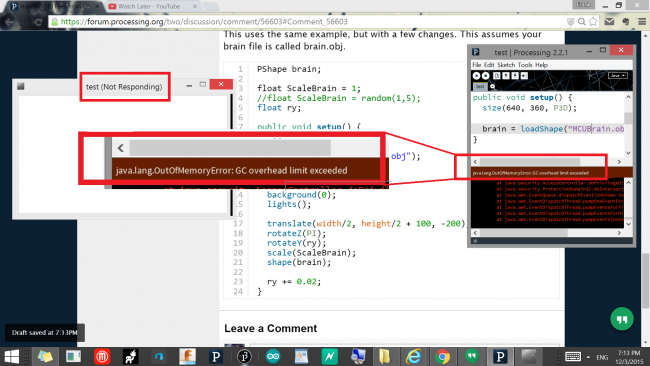Howdy, Stranger!
We are about to switch to a new forum software. Until then we have removed the registration on this forum.
Categories
- All Categories 25.7K
- Announcements & Guidelines 13
- Common Questions 30
- Using Processing 22.1K
- Programming Questions 12.2K
- Questions about Code 6.4K
- How To... 4.2K
- Hello Processing 72
- GLSL / Shaders 292
- Library Questions 4K
- Hardware, Integration & Other Languages 2.7K
- Kinect 668
- Arduino 1K
- Raspberry PI 188
- Questions about Modes 2K
- Android Mode 1.3K
- JavaScript Mode 413
- Python Mode 205
- Questions about Tools 100
- Espanol 5
- Developing Processing 548
- Create & Announce Libraries 211
- Create & Announce Modes 19
- Create & Announce Tools 29
- Summer of Code 2018 93
- Rails Girls Summer of Code 2017 3
- Summer of Code 2017 49
- Summer of Code 2016 4
- Summer of Code 2015 40
- Summer of Code 2014 22
- p5.js 1.6K
- p5.js Programming Questions 947
- p5.js Library Questions 315
- p5.js Development Questions 31
- General 1.4K
- Events & Opportunities 288
- General Discussion 365
In this Discussion
- benja November 2015
- FrankOcean December 2015
- PDF197 December 2015
deleted
This discussion has been closed.


Answers
There is an example in Basics->Shape->loadDisplayOBJ
no yes i just noticed this tho it was not there i stumble across it by messing around with the ide add library, but i have a model obj file of a brain and i want to know how do i increase rendering speed or size of model in processing ? or do i gotta do all that in my 3d modeling prog?
?
Easiest way is to just add scale(); - see the edited example below. This simply imports the rocket in the example twice the size i.e. scale(2);
@PDF197 does scale() takes any arguments in the constructor? i mean am i putting the brain obj inside the "scale(brain)"?
No, scale(brain) would not work.
I do not know how far you have gone with this, or how much you know already so a hint... Someone might have a better way, but if you want to change the scale using a sensor input from Arduino think this way this...
The scale(); function needs a float (number) to know how much to scale the model that is being imported. For example, scale(2); would import your model at double the original size.
What you can do is define your own float at the start of your sketch, e.g. float ScaleBrain = 1. Use scale(ScaleBrain) to create a variable, you can then control with your Arduino input.
This uses the same example, but with a few changes. This assumes your brain file is called brain.obj.
i hear you ill keep this info in mind BUT this is not a arduino in or output this is just a obj model ONCE im close to done then the arduino will communicate via rs232 to processing but this is not where im at NOW im simply trying to have the brain model "imported" then i want to have it interact with the serial com port....
tho as in now i did try your sketch above but i got this error about memory ? im not sure i uploaded a screenshot hope this helps you help me,
That suggests the file you are importing is quite big. How many vertices/faces etc. does it have? Try this:
Open Processing > Go to preferences > Tick the "Increase Maximum Memory... box > increase to 512Mb (or more) > OK > Run sketch again.
hmmm i never thought of the memory increase, ill try that tho the obj is 45mb wow i dint even kno that ! im not sure about the vertices tho i did found all this other info tho. that memory in Processing was @256 ill jacked it up to 1000mb i did not noticed a diff, i even got this sketch that run in draw six gif and a face dtection sketch i merged to it from a example and the gif are all lagging like as 1 fps even tho i have it set to 100 frames here is the setup & draw but the facedetection dont even do its job the cam opens up but dont detect squat! ughh